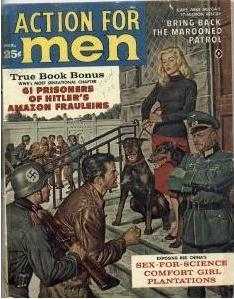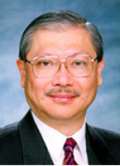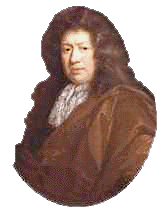
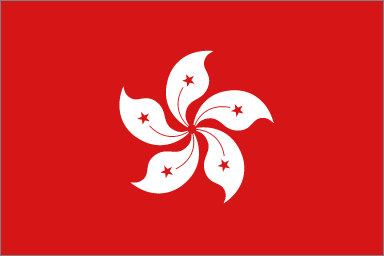
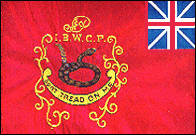
Take out the 60 Legislative Councillors and 36 local deputies to the National People's Congress, and the 40 people returned by religious groups and the 237 who were unopposed, and 427 folk are being picked in today’s nail-biting ‘embodiment of democracy’ (Beijing), the Election Committee Election. If the past is any guide, the majority of the 200,000 eligible to vote won’t bother. Which is hardly surprising, since the 800 members of the resulting Election Committee will take part in a make-believe poll next March in which the man Beijing will already have chosen – presumably Donald Tsang – will ‘win’. However, turnout will probably be a bit stronger than usual, since Mainland officials are pressing everyone they know to vote against pro-democracy candidates to ensure that fewer than 100 of them end up on the Election Committee and thus unable to nominate Civic Party member Alan Leong to run against Sir Bow-Tie. He would have no chance of beating the chosen man, but that’s not good enough for Beijing, who are alone in taking the charade seriously.
For real excitement, we need to look across the Pearl River Delta to Macau. The story so far… Investigating some unusual transfers of money into and out of local bank accounts, Hong Kong’s fearless and determined Independent Commission Against Corruption found evidence of graft pointing at Ao Man-long, Macau’s senior official in charge of public works, land and transport. They notified Beijing, who picked up the phone and bawled out the city’s Chief Executive, Edmund Ho. He had Ao and others arrested and made a forthright announcement expressing his deep, deep shock and essentially declaring Ao guilty, which is apparently acceptable behaviour in ex-Portuguese colonies.
Where it gets interesting is that Macau is a very small place where everyone knows everyone else. Edmund Ho knows Ao very well indeed – they are old buddies. Ho obviously also knew, not to say approved and authorized, that nearly every disposal of public land and many contracts for infrastructure since he became Chief Executive have been decided behind closed doors. Two local legislators have long complained about this (notably the cost of East Asian Games stadium, which was suspiciously over-budget), but Ho denounced them as rabble-rousers making noise and disrupting harmony. Estimates of the amount Ao and others have pocketed range up to HK$1 billion. If Ho knows nothing about what would appear to be massive bribery, he is guilty of breathtaking negligence, as if he had been living in a hermetically sealed box since 1999. But that’s the line he’s going to have to take. What will Ao have to say about his boss at trial?
(An email to the newsreaders at Radio Television Hong Kong is in order, explaining that ‘Ao’ is the same as the name usually rendered ‘Eu’ in the Big Lychee, and either way is pronounced ‘Oh’ – or in this case, perhaps, ‘Oh!’)
Mon, 11 Dec
Hong Kong’s political system has served Richard Li well. It put Tung Chee-hwa, a former business partner of his father’s, into the office of Chief Executive, giving him access to the man at the top that most people his age, or any age, could only dream of. It lacks checks and balances to the extent that he was able to convince old Tofu-for-Brains in 1999 to give him the last large parcel of flat land on Hong Kong island, on which he would build luxury apartments, which he would sell to make billions in profit with a bit left over to build the Government an office block called Cyberport.
But being the son of Li Ka-shing involves carrying a bit of baggage. In early 2000, Hong Kong Telecom, a fixed-line operator in a wireless world, had just lost its monopoly, so its commercial prospects were poor. As would be expected, the Singapore Government thought buying this lemon would be an excellent use of its long-suffering citizens’ cash, because it would make the Lion City look oh-so big and important. Although there was no law against it, Beijing paranoids were desperate to ensure the company didn’t fall into foreign hands, apparently fearing that dreaded overseas forces would eavesdrop on their extremely interesting conversations. Thus daddy, always eager to please, made Richard buy Hong Kong Telecom. Six years later, when he wanted to ditch his share of the assets, now named PCCW, the same sort of problem arose. He wanted to sell to Australians and Americans, so Beijing leaned on daddy to buy it and use the holding to enable a Beijing-owned company to control the firm, but minority shareholders in Singapore (smart private ones, not dimwit Government fund managers) vetoed the deal.
Being forced to buy and keep a rubbish company to please a group of suspicious communists would leave most people with a sour taste in their mouths, and this has presumably played a part in the development of Richard’s political philosophy. By his own admission, it is still forming, but in essence he has come out as a pro-democrat. Few things look more idiotic than a scion of the business class spouting the sort of views that come naturally from elderly tycoons’ lips – Hong Kong people are not mature enough for universal suffrage, etc. Such creatures do exist, taking their cues from fathers and ‘uncles’ who live in constant fear of Beijing damaging their business interests unless they say the right thing. Usually, however, vaguely mindful of the fact that such comments sound stupid, the junior plutocrats hold their silence.

The pan-democrats take 134 seats on the Election Committee. That still leaves an ominous 666 members who will vote the way Beijing tells them, so there is no chance of Alan Leong unseating Donald Tsang as Chief Executive – but who in their right mind would really, deep down, want one of our pleasant and well-meaning but ultimately unqualified amateur politicians trying to run the city? The Central People’s Government’s agents in Hong Kong will now try to turn the screws on at least some of the 134 to prevent Leong getting the 100 nominations needed to get on the ballot. Under Tung Chee-hwa, when nominations were public, they didn’t need to intimidate members of the Election Committee. Now, they will have to make phone calls. “How badly do you want that promotion to head of the Biochemistry Department?” Or “We know what you get up to in Shenzhen at weekends – does your wife?” Or “Your poodle Trixiebelle is a gorgeous dog – wouldn’t it be a pity if you woke up one morning and found her severed head on your pillow?”
ANOTHER LAWYER, Lo Tak-shing, passes away at the age of 71. While some will recall him as a renowned patriot, others will remember a faithful running dog of the British colonial administration who cynically and viciously turned against his master in a vain (in both senses) attempt to ingratiate himself with the communists and become Chief Executive. In this he seems to have been supported by the gruesome Li Peng’s power base in Beijing, which was presumably how he obtained a PRC passport before Hong Kong citizens were eligible for them. He funded a pro-Beijing English weekly magazine called Window, which was better than it sounded. When asked whether the media would be allowed to mention Taiwan independence under his rule, he responded with a smile that the press would be perfectly free to report the arrest of people supporting it. Then it became obvious that the crop-haired one was also the anointed one, post-1997. As a consolation prize, Tung gave Lo a Grand Bauhinia Medal the day after the handover in 1997, with fellow member of the National Association of Self-Promoting Anti-British Wackos Elsie Tu looking on. After that, he faded into increasing obscurity, which will become total after today’s last flash of prominence.
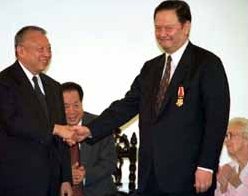
Protestors storm the old Star Ferry pier in an attempt to halt its demolition. Nowhere else in the world would anyone be greatly upset by the disappearance of the 50-year-old, utilitarian structure. In terms of form and style, it simply says, “Yes, even half a century ago, Government architects were totally devoid of the slightest hint of creativity or imagination.” Aesthetics are to public-sector building designers what the active ingredient is to homeopathic medicine – thinned out to the extent that not a single molecule remains. So it seems a curious cause for civil disobedience.
But nowhere else in the world would the Government have eradicated or obscured nearly every other feature that brings back old memories, let alone fill in a large chunk of a beautiful harbour in order to build a freeway along the waterfront and a shopping mall like 99 others, full of skin-whitening shops and golf shoe retailers. It’s like Blake’s Pier, a tatty little spot on which visiting relatives could be abandoned for hours and be happy, and is now somewhere underneath the concrete east of 2 IFC. It wasn’t beautiful, but it was useful and there was nothing else like it. We are replacing things that have some sort of uniqueness with objects that are identical to thousands of others here and across the planet.
Thurs, 14 Dec
Today’s big story – an official inquiry in the UK has determined that Princess Diana died because people usually do when they are in a car being driven at over 100 miles an hour into a concrete wall. But there is an elite group of people who have no interest in the death 10 years ago of a rich blonde too dim to make it through high school. They enjoy their breakfasts this morning in the Foreign Correspondents Club, speaking in soft tones about important affairs of the law, finance and, in the case of myself and shapely Administrative Officer Winky Ip, yesterday afternoon’s Great 2006 Star Ferry Pier Incursion. Even as legislators held an emergency debate on whether the old building could be preserved, police launched Operation Strong Governance For The People and moved in to remove the activists occupying the site, and within an hour the demolition was underway again. “Is this Donald’s idea of good publicity?” I ask my buxom bureaucrat buddy.
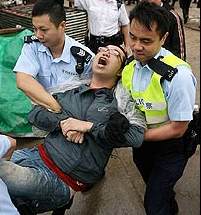
I pour Winky some jasmine tea. She and her colleagues deserve some sympathy. It must be terrible to go through life constantly being forced by planning and consultation procedures to do things everyone thinks are stupid.
Fri, 15 Dec
Sitting in the IFC Mall branch of Pacific Coffee, sipping my festive organic winkleberry and mistletoe cappuccino, my heart glows with pride to read that Hong Kong has won 638 medals at the Asian Games in the famous Asian city of Doha, Asia. We tried to have these games held here in the Big Lychee, if I recall correctly – one of Tofu-for-Brains’ desperate attempts to put Hong Kong ‘on the map’ when he was halfway through trashing the body and soul of the place. But the organizers preferred Doha, Asia, because it was so much more Asian, with all those nubile, almond-eyed beauties frolicking among its paddy fields and Buddhist temples. We must put our city’s sporting prowess in perspective. China has accumulated 19,084 medals – no fewer than 107 of them in various permutations of synchronized female diving, 91 of them in the ancient martial art of Wu Gong Fu Xu and 42 in ‘groups of 7ft 6in men taking it in turns to throw a ball through a hoop’.
Wild American friend Odell sits down opposite me. He points at my chest. “There’s some sort of light in there, under your shirt.” I explain about my heart and how the achievements of our sportsmen and women have affected it. He shows me his wallet. “I’m out of cash. Can you lend me a few hundred bucks? The nearest ATM’s miles away.”
I put my newspaper down and give him one of my special Hard Stares. “Then I would have to go to the ATM earlier than I would otherwise have to do,” I explain. “So what you’re really asking me to do is go to the ATM for you. Which obviously I am not going to do, because it would encourage you to be a pathetic, parasitical, lazy scumbag who leeches off decent people who have a sense of responsibility and make a point of getting cash before they run out.”
He thinks about this. “Uhh… yeah, OK.” And off he goes, past the McDonald’s with its 20-deep lines of office workers buying breakfast, past the boutiques that never have any customers, past the skin-whitening supplies outlets, all the way to the distant corner of the mall, leaving me alone with his copy of Action For Men, which I soon abandon in favour of Asia’s two greatest English-language newspapers. They both carry a whiny article by Michael Suen, the bureaucrat of partial otter descent whose whole existence, presiding over the world’s most psychopathic Housing, Planning and Lands Bureau, is devoted to perfecting procedure and process as an end in itself rather than as a means to anything useful. In essence, he is saying…
“It’s nothing to do with the Government. We are being forced to demolish the Star Ferry Pier by planning and consultation procedures, which were all carried out totally correctly. And anyway, if we stopped now, we would have to pay massive cancellation fees to the construction companies, owing to extremely generous clauses in the contracts, in which, by the way, it goes without saying, the Independent Commission Against Corruption would have not the slightest interest. It’s all the fault of you, the public, and your elected legislators for not finding out years ago that the Harbourfront Beautification, Enhancement and Protection Vision called for construction of a freeway on the shoreline and the total eradication of anything that brings back memories of when you were a kid. You are all very exasperating and hard to please these days, and you’re jolly lucky that my colleagues and I continue to serve you. Now butt out of my demolition site.”
